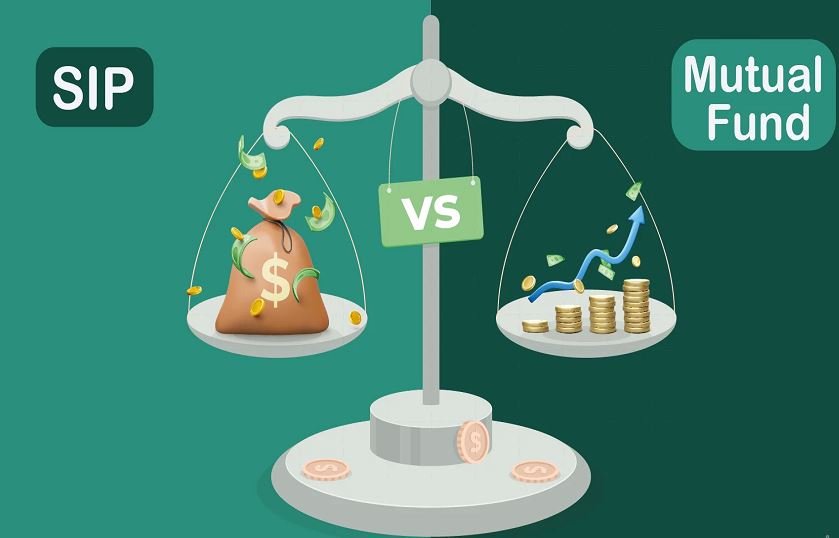It is crucial to understand the prominent differences between SIP vs mutual fund. This understanding will help you choose the most suitable investment alternative that aligns with your financial objectives.
1) SIP vs Mutual Fund: Basics of SIP and How Is It Unique from Mutual Funds?

With myriad investment choices in the market, it becomes daunting for any investor to pick a suitable one. SIP (Systematic Investment Plan) is a method of investing in mutual funds. It lets investors invest a fixed sum of money at regular intervals (quarterly or monthly). It assists in decreasing the effect of market volatility and even benefits investors from rupee cost averaging. The concept means more units are bought when the price drops and vice versa.
Conversely, mutual funds are nothing but investment portfolios that professionals manage. These professionals amass money from several investors and then invest in securities (such as bonds, stocks, or money market instruments). Their qualities, like liquidity, diversification, and efficient management, make them apt for investors who lack sufficient time or skill to establish a portfolio themselves.
Both mutual funds and SIPs are investment tactics. However, note that SIP is an approach to capitalization in mutual funds; unlike mutual funds, it’s not a distinct investment alternative. SIP lets investors benefit from market fluctuations and amass wealth over time. Conversely, mutual funds are investment vehicles accessible via lump sum investments or SIPs.
Carefully understanding the SIP vs mutual fund differences can aid investors in making proper decisions and opting for the suitable investment approach.
2) Advantages and Drawbacks of SIP Investing

To thoroughly understand SIP vs mutual fund difference, let’s look at the advantages and disadvantages of SIP:
Pros:
It instils discipline in investors. The fixed investment amount at regular intervals means investors are less likely to be affected by short-term market fluxes. Eventually, it contributes to long-term investment.
The cost-averaging feature facilitates investors’ purchasing more units whenever prices drop and vice versa. This decreases the total cost of investment and helps tackle the effect of market volatility. Conversely, lump sum investments made in mutual funds are more vulnerable to timing the market precisely. This vital mutual funds SIP vs lump sum difference helps make informed decisions.
Cons:
It might limit the capacity for high returns. Investors may miss purchasing prospects when markets go low and can’t reap benefits for high returns. This aspect is essential to consider when determining mutual fund vs SIP which is better.
It makes the investment performance better.
3) Pros and Cons of Mutual Fund Investing

Pros:
Investors can explore a wide range of securities (bonds, stocks, and money market instruments) through solitary investments.
Diversification reduces the risk of investing in a single sector or stock, providing a more balanced portfolio.
One important SIP vs mutual fund difference is that mutual funds are administered by professionals conducting in-depth research and analysis, contributing to satisfactory returns.
Cons:
One stock SIP vs mutual fund SIP difference in context is that high expense ratios could deteriorate your returns. This is especially noticeable when compared to directly investing in stocks.
Mutual funds are vulnerable to market risks. A downturn can lead to depreciation in the fund’s value.
Mutual funds are less flexible than direct stock investments. Investors have limited control over individual securities in the portfolio.
4) Risk Levels: SIP vs Mutual Funds

Risk levels are essential to consider before deciding between SIP vs mutual fund.
SIPs are considered safer owing to the rupee cost-averaging tactic. So, they are ideal for cautious investors seeking sustained wealth accumulation. On the contrary, mutual funds offer great opportunities for high returns but also come with higher risk. This aspect is vital when considering SIP vs mutual fund vs shares. Mutual funds are appropriate for investors capable of sustaining transient market shifts.
5) Factors to Consider When Choosing from SIP vs Mutual Fund

You can consider the factors below for a thorough SIP vs mutual fund comparison.
Investment horizon:
SIPs are appropriate for long-term objectives, whereas mutual funds fulfil short-term and long-term goals.
Risk tolerance:
SIP’s phased and disciplined approach allows it to provide a more risk-controlled strategy. Mutual funds may entail different levels of risk based on their type. Assess your risk appetite and then choose your investment option.
Investment cost:
SIPs usually allow investors to begin with smaller investments at regular intervals, making them affordable options for investors with limited funds. Conversely, mutual funds boast higher initial investment requisites, affecting the affordability of certain investors.
6) SIP vs Mutual Fund: Comparison Table
The following SIP vs lump sum mutual fund comparison table clarifies all critical aspects of these methods.

| Sr. No. | Point of Comparison | SIP | Mutual Fund |
| 1 | Investment approach | Investment is in a fixed amount, at regular intervals. It fosters regular savings and reduces the effect of market fluctuations. | Allow investors to either select a lump sum amount or make periodic investments. The fund manager makes investment decisions considering the fund’s goal and strategy. |
| 2 | Investment form | It involves periodically investing a certain sum of money. | Mutual fund investments can be accomplished in two forms: lump sum or SIP. |
| 3 | Flexibility | Can change or discontinue | Can be hard to redeem or sell units, specifically in closed-ended funds |
| 4 | Risk mitigation | Helps solve the risk of market timing because investments are spread over time, reducing the effect of market volatility. | Risks could be low to high, based on the type of mutual funds, market timing, investment frequency, etc. |
| 5 | Returns | Has the potential of high returns across the long-term | Has the potential for high returns across the long term but also boasts high risk |
| 6 | Volatility | Diversifies purchases over time, decreasing exposure to long-term market swings. | Beginners need help with optimal market entry timing, specifically in lump sum investments. |
| 7 | Affordability | The flexibility of investing in smaller sums at regular intervals makes it more affordable. | This is an important mutual fund lumpsum vs SIP difference. It is uncertain whether mutual fund investment could be affordable or not, in the case of SIP or lump sum investment. |
Conclusion:
When determining the SIP vs mutual fund difference, it is vital to consider the effect of potential lock-in periods and your liquidity requirements.Evaluating these factors per your financial objectives will let you make a wise investment decision. The choice between a mutual fund lump sum vs SIP relies on an investor’s financial objectives, term of investment, and risk tolerance. Contacting a financial advisor like BeWealthy before investing is recommended to ensure that the chosen method fulfils your objectives and economic conditions.
FAQs
1. Is there any difference between SIPs and mutual funds in the context of returns and risk?
Both mutual funds and SIPs provide the same level of return and risk. However, SIPs are a safer option when the stock market becomes highly volatile.
2. Is it recommended that investments within mutual funds be spread out through SIP?
It is advantageous to invest in multiple SIPs. However, investing in many SIPs might lead to excess diversification and weaken the returns you earn. This SIP vs. lumpsum mutual fund difference helps in easy comparison.
3. Which one is better –SIP or mutual funds- if I want to make higher profits?
Mutual funds support diverse multiple options, whereas SIP serves as a method to systematically capitalize on mutual funds over time. Both approaches can provide profit opportunities based on investment strategies and market conditions.

